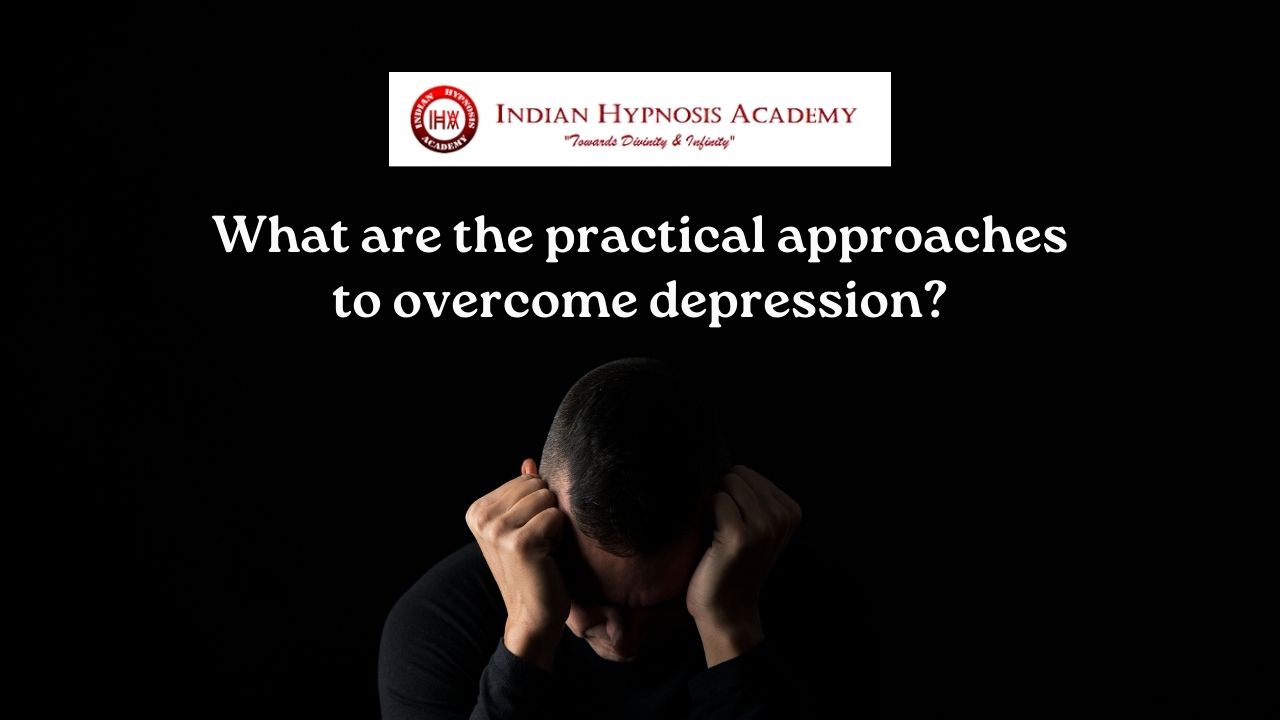Feeling overwhelmed, hopeless, or stuck in a cycle of negativity? You’re not alone. Depression can cast a shadow over every aspect of your life, making even the simplest tasks feel insurmountable. But here’s the thing – there is hope. In this blog post, we’ll explore practical approaches to overcoming depression that go beyond traditional treatment methods. From lifestyle changes to building a support system and seeking therapy, let’s dive into actionable strategies that can help you reclaim your joy and well-being.
Understanding Depression
Depression is more than just feeling sad or down; it’s a complex mental health condition that can impact every part of your life. It goes beyond temporary feelings of unhappiness and can linger for weeks, months, or even years. The symptoms of depression vary from person to person but often include persistent sadness, loss of interest in activities, changes in appetite or sleep patterns, and difficulty concentrating.
It’s important to understand that depression is not a sign of weakness or something you can simply “snap out of.” It is a real medical illness that requires attention and care. While the exact causes of depression are not fully understood, it can be triggered by a combination of genetic, biological, environmental, and psychological factors.
If you suspect you may be experiencing depression symptoms, reaching out for help is crucial. Seeking support from loved ones and healthcare professionals can make a significant difference in your journey towards healing. Remember – there is no shame in seeking help for your mental health.
Traditional Treatment Options
Traditional treatment options for depression often involve medication prescribed by a healthcare professional. These medications can help regulate brain chemicals and alleviate symptoms of depression. It’s essential to consult with a doctor before starting any medication to ensure it is the right fit for your needs.
Another traditional approach is psychotherapy, also known as talk therapy. This form of treatment involves speaking with a therapist to explore emotions, thoughts, and behaviors that may contribute to feelings of depression. Through counseling sessions, individuals can gain insight into their condition and learn coping strategies.
In some cases, electroconvulsive therapy (ECT) may be recommended for severe or treatment-resistant depression. ECT involves passing electrical currents through the brain to induce controlled seizures, which can effectively alleviate depressive symptoms in certain individuals.
Traditional treatment options provide valuable tools for managing depression and improving overall well-being. It’s important to work closely with healthcare professionals to determine the most suitable course of action based on individual needs and preferences.
Alternative Approaches to Overcome Depression
When traditional treatment options for depression don’t seem to be the right fit, exploring alternative approaches can offer a new perspective on managing your mental health. Alternative therapies like acupuncture, meditation, and yoga have shown promising results in alleviating symptoms of depression by promoting relaxation and mindfulness.
Nutritional supplements such as omega-3 fatty acids and vitamin D have also been studied for their potential benefits in supporting mood regulation. Engaging in creative outlets like art therapy or music therapy can provide a cathartic release for pent-up emotions, offering a non-verbal way to express thoughts and feelings.
Spending time outdoors in nature or adopting a pet can boost mood and reduce feelings of loneliness. Additionally, incorporating holistic practices like aromatherapy or herbal remedies into your self-care routine may help promote emotional well-being. Explore these alternative approaches to find what resonates with you on your journey towards overcoming depression.
Lifestyle Changes for Managing Depression
Making positive lifestyle changes can have a significant impact on managing depression. One key aspect is maintaining a balanced diet rich in nutrients that support mental well-being. Incorporating regular exercise into your routine can also help boost mood and reduce stress levels.
Getting an adequate amount of quality sleep is crucial for overall mental health. Establishing a consistent sleep schedule and creating a relaxing bedtime routine can improve sleep quality. Additionally, practicing mindfulness techniques such as meditation or yoga can help calm the mind and enhance emotional resilience.
Limiting alcohol consumption and avoiding recreational drugs is essential as they can exacerbate depressive symptoms. Engaging in activities you enjoy, whether it’s hobbies, spending time outdoors, or socializing with loved ones, can provide a sense of purpose and fulfillment.
Prioritizing self-care practices like taking breaks when needed, setting boundaries, and practicing self-compassion are vital for maintaining emotional well-being. Remember to be kind to yourself during this journey towards better managing depression.
Seeking Support from Loved Ones
When it comes to overcoming depression, seeking support from loved ones can be a crucial aspect of the journey. It’s essential to lean on those who care about you and are willing to listen without judgment. Opening up about your feelings and struggles can help alleviate the weight you may be carrying.
Your loved ones can offer comfort, encouragement, and a sense of belonging during challenging times. Simply knowing that there are people in your corner rooting for you can make a significant difference in how you navigate through depression.
Whether it’s a close friend, family member, or partner, having someone to talk to and share your emotions with is incredibly valuable. Sometimes just having someone by your side as you go through tough moments can provide immense relief.
Don’t hesitate to reach out when you need a listening ear or a shoulder to lean on. Remember that vulnerability is not weakness – it takes strength to ask for help when you need it most.
The Power of Therapy and Counseling
Therapy and counseling provide a safe space to explore your thoughts, feelings, and experiences. A trained professional can offer guidance and support as you navigate through challenging emotions. Through therapy, you can gain valuable insights into the root causes of your depression.
Counseling sessions allow you to develop coping strategies and tools to manage depressive symptoms effectively. Therapists use various techniques such as cognitive-behavioral therapy (CBT) or mindfulness practices tailored to your specific needs. These approaches help reframe negative thought patterns and promote self-awareness.
By engaging in therapy, you can work towards building resilience and improving your mental well-being. It’s essential to remember that seeking help is a sign of strength, not weakness. Therapy offers a non-judgmental environment where you can express yourself freely without fear of being criticized.
The therapeutic relationship between you and your counselor plays a crucial role in promoting healing and growth. Together, you can identify goals for treatment and collaborate on creating a personalized roadmap towards recovery. Remember that it’s okay to ask for help when needed – reaching out is the first step towards regaining control over your mental health journey.
Practical Approaches for Overcoming Depression
When it comes to practical approaches for overcoming depression, there are several strategies that can help you navigate through tough times. Therapy and counseling provide a safe space to explore your emotions and develop coping mechanisms. Medication prescribed by a healthcare professional can also be beneficial in managing symptoms.
Self-care and healthy habits play a crucial role in boosting mood and overall well-being. Engaging in activities you enjoy, practicing mindfulness, getting regular exercise, and maintaining a balanced diet are all essential components of self-care.
It’s important to remember that progress takes time, so be patient with yourself throughout the journey of healing. Developing a routine that incorporates these practices into your daily life can make a significant difference in how you feel on a day-to-day basis.
A. Therapy and Counseling
Therapy and counseling can be incredibly helpful tools in overcoming depression. Speaking with a trained professional provides a safe space to explore your thoughts and emotions without judgment. Therapists can offer valuable insights and coping strategies tailored to your individual needs. Through regular sessions, you can gradually work through underlying issues contributing to your depressive symptoms.
Cognitive-behavioral therapy (CBT) is a common approach used to challenge negative thought patterns and behaviors that fuel depression. It helps you develop healthier ways of thinking and responding to situations, ultimately improving your overall mental well-being. Additionally, other forms of therapy such as interpersonal therapy or psychodynamic therapy may also be beneficial depending on your specific circumstances.
Remember, therapy is not a one-size-fits-all solution but rather a personalized journey towards healing. Don’t hesitate to seek support from a therapist who resonates with you and makes you feel comfortable sharing openly about your struggles. Therapy is an empowering step towards reclaiming control over your mental health.
B. Medication
Medication can be a helpful tool in managing depression for some individuals. It is important to consult with a healthcare professional before starting any medication regimen. There are various types of antidepressants available, each targeting different neurotransmitters in the brain to help alleviate depressive symptoms. Finding the right medication and dosage may take time and patience, as everyone’s response to medication can vary.
It’s essential to follow your doctor’s instructions carefully when taking antidepressants. Some common side effects may occur initially, but they often diminish over time or with adjustments to the dosage. Regular check-ins with your healthcare provider are crucial to monitor progress and make any necessary changes.
Remember that medication is just one component of treating depression; it is often most effective when combined with therapy, self-care practices, and lifestyle adjustments. Always communicate openly with your healthcare team about how you are feeling while on medication so that they can provide you with the best support possible.
C. Self-Care and Healthy Habits
Taking care of yourself is vital when it comes to overcoming depression. Engaging in regular physical activity can help boost your mood and reduce feelings of anxiety. Whether it’s going for a walk, practicing yoga, or hitting the gym, finding an exercise routine that works for you is key.
Eating a balanced diet rich in fruits, vegetables, whole grains, and lean proteins can also have a positive impact on your mental well-being. Avoiding excessive consumption of caffeine and alcohol is important as they can worsen symptoms of depression.
Getting enough sleep each night plays a crucial role in managing depressive symptoms. Establishing a bedtime routine and creating a restful environment can improve the quality of your sleep.
Incorporating relaxation techniques such as deep breathing exercises or meditation into your daily routine can help calm your mind and reduce stress levels. Prioritizing self-care activities that bring you joy and relaxation is essential for maintaining emotional balance during challenging times.
Tips for Coping with Depressive Symptoms on a Daily Basis
One of the key tips for coping with depressive symptoms on a daily basis is to establish a routine. Having a structured schedule can provide stability and a sense of control, helping to alleviate feelings of overwhelm. It’s important to prioritize self-care activities such as getting enough sleep, eating well-balanced meals, and engaging in regular physical exercise.
Mindfulness techniques like deep breathing exercises or meditation can help you stay present and manage racing thoughts. Finding small moments of joy each day, whether it’s enjoying a cup of tea, listening to your favorite music, or spending time in nature, can make a big difference in improving your mood.
Setting realistic goals and breaking them down into manageable tasks can prevent feelings of being overwhelmed by responsibilities. Reach out for support from trusted friends or family members when needed – talking about your feelings can be incredibly therapeutic.
Remember that progress may not always be linear; some days will be tougher than others, but every step forward counts towards your journey to healing.
Building a Support System
Building a support system is crucial when it comes to overcoming depression. Surrounding yourself with understanding and compassionate individuals can make a significant difference in your journey towards healing. Whether it’s family members, friends, or support groups, having a strong network of people who care about you can provide comfort and reassurance during difficult times.
Opening up to loved ones about your struggles allows them to offer emotional support and encouragement. It’s important to communicate openly and honestly about how you’re feeling so that they can better understand what you’re going through. Remember, you don’t have to face depression alone – there are people who want to help and support you every step of the way.
In addition to personal connections, seeking professional help from therapists or counselors can also be an essential part of building a robust support system. These trained professionals can provide guidance, coping strategies, and a safe space for you to express your emotions without judgment.
Don’t underestimate the power of human connection in combating feelings of isolation that often accompany depression. Building a supportive community around you creates a sense of belonging and reminds you that there are people who genuinely care about your well-being.
Overcoming Stigma Surrounding Mental Health
Overcoming the stigma surrounding mental health is a crucial step in seeking help and support for depression. Society often attaches negative stereotypes to those struggling with mental health issues, causing many individuals to suffer in silence. It’s essential to educate ourselves and others about the realities of mental illness, breaking down misconceptions and fostering empathy.
By sharing our own experiences or listening without judgment when others open up, we can create a safe space for conversations about mental health. Understanding that seeking help is a sign of strength rather than weakness is key in reducing stigma. Encouraging open discussions about emotions and well-being helps normalize the conversation around mental health.
It’s important to remember that anyone can experience challenges with their mental health, regardless of age, gender, or background. By supporting one another without prejudice or discrimination, we can work towards a more inclusive society where everyone feels comfortable seeking help when needed.
Conclusion: You Are Not Alone
Remember, depression is a common struggle that many people face, but it does not define who you are. By understanding the various approaches to managing and overcoming depression, seeking support from loved ones, and utilizing therapy and counseling services, you can take proactive steps towards improving your mental health.
It’s important to remember that you are not alone in this journey. There are resources available to help you navigate through this challenging time. With the right support system and a commitment to self-care, you can overcome depression and regain control of your life.
Always prioritize your mental well-being and never hesitate to reach out for help when needed. Remember, there is hope and healing on the other side of depression. You deserve to live a fulfilling and joyful life – don’t be afraid to take the first step towards recovery. You are not alone.




